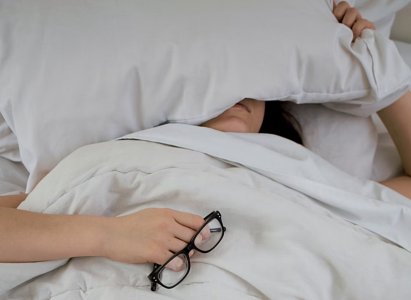Trouble sleeping? A newly approved device could offer a quiet breakthrough
- Replies 4
If falling asleep feels like an uphill battle, and waking up feels like you ran a marathon, you’re not alone.
Millions of Americans, especially those over 60, are fighting a nightly war with poor sleep, snoring, fatigue, and mysterious midnight wake-ups.
But what if the answer wasn’t a bulky machine or a hospital stay, but a simple ring you wear on your finger?
Diagnosing sleep apnea used to mean a trip to a sleep lab, an overnight stay, and more wires than a home stereo system. But thanks to researchers at the 2025 American Thoracic Society Conference, that’s changing.
Enter: a ring-shaped pulse oximeter—a small, comfortable, wireless device that tracks your blood oxygen levels, breathing patterns, and other vital signs while you sleep.
No cords. No disruption. Just real-time insights from your own bedroom.

This wearable device pairs with a smartphone app, making it easy to share sleep data with your doctor. In a recent clinical trial, participants were asked to wear the ring for 9 nights—but more than 85% wore it longer, with one participant using it for 44 nights straight.
That’s how comfortable it is.
As Ketan Mehta of Apnimed explained, “It may be better to collect one or two channels of data over 25 nights than 25 channels over one night.”
In other words, long-term, at-home monitoring may offer a clearer picture of your sleep than a one-night lab study ever could.
Also read: Always tired? These hidden health conditions could be draining your energy
If you’re thinking, “Doesn’t my smartwatch already track sleep?”—you’re half right. Devices like the Apple Watch or Oura Ring can detect general patterns, but they’re not approved by the FDA for medical use for serious sleep conditions.
This ring is.
It bridges the gap between clinical accuracy and real-life comfort, making it the first of its kind to offer medical-grade sleep monitoring at home.
And it’s not alone: researchers at the University of Cambridge recently unveiled “smart pajamas” that detect sleep disorders with over 98.6% accuracy. The era of sleep tech is here—and it’s more accessible than ever.
Also read: Unlock the secret to a better night’s sleep with just one surprising food!

Have you battled sleep apnea or struggled with restless nights? Would you try a wearable ring like this to track your sleep? What’s your go-to sleep hack? Drop your thoughts, questions, and experiences in the comments below. Your insight could help someone else in the GrayVine community finally get the rest they deserve.
Millions of Americans, especially those over 60, are fighting a nightly war with poor sleep, snoring, fatigue, and mysterious midnight wake-ups.
But what if the answer wasn’t a bulky machine or a hospital stay, but a simple ring you wear on your finger?
Diagnosing sleep apnea used to mean a trip to a sleep lab, an overnight stay, and more wires than a home stereo system. But thanks to researchers at the 2025 American Thoracic Society Conference, that’s changing.
Enter: a ring-shaped pulse oximeter—a small, comfortable, wireless device that tracks your blood oxygen levels, breathing patterns, and other vital signs while you sleep.
No cords. No disruption. Just real-time insights from your own bedroom.

Millions of Americans, especially those over 60, are fighting a nightly war with poor sleep. Image Source: Isabella Fischer / Unsplash
This wearable device pairs with a smartphone app, making it easy to share sleep data with your doctor. In a recent clinical trial, participants were asked to wear the ring for 9 nights—but more than 85% wore it longer, with one participant using it for 44 nights straight.
That’s how comfortable it is.
As Ketan Mehta of Apnimed explained, “It may be better to collect one or two channels of data over 25 nights than 25 channels over one night.”
In other words, long-term, at-home monitoring may offer a clearer picture of your sleep than a one-night lab study ever could.
Also read: Always tired? These hidden health conditions could be draining your energy
If you’re thinking, “Doesn’t my smartwatch already track sleep?”—you’re half right. Devices like the Apple Watch or Oura Ring can detect general patterns, but they’re not approved by the FDA for medical use for serious sleep conditions.
This ring is.
It bridges the gap between clinical accuracy and real-life comfort, making it the first of its kind to offer medical-grade sleep monitoring at home.
And it’s not alone: researchers at the University of Cambridge recently unveiled “smart pajamas” that detect sleep disorders with over 98.6% accuracy. The era of sleep tech is here—and it’s more accessible than ever.
Also read: Unlock the secret to a better night’s sleep with just one surprising food!
What is Sleep Apnea—and why should you care?
Obstructive Sleep Apnea (OSA) happens when your airway becomes blocked during sleep, causing you to stop breathing temporarily—often without even knowing it. Over time, OSA can lead to:- High blood pressure
- Heart disease
- Stroke
- Diabetes
- Daytime fatigue and increased accident risk
Why at-home sleep monitoring matters
Here’s what makes this wearable such a breakthrough:- Comfortable and Discreet: Wear it like a ring—no wires, no awkward straps.
- Long-Term Data: Track your sleep over several nights or weeks, not just a single lab visit.
- Actionable Insights: Share detailed results with your doctor for better, more tailored care.
- Early Intervention: Spot warning signs before they escalate into serious health issues.
Key Takeaways
- A new FDA-approved, ring-shaped device offers clinical-grade sleep apnea monitoring in the comfort of your own home.
- The device eliminates the need for overnight sleep lab studies, making diagnosis easier and more accessible.
- Unlike popular gadgets like the Apple Watch, this wearable is approved for medical use and tracks critical health data while you sleep.
- Sleep apnea, if left untreated, can lead to serious long-term health problems, but early detection and intervention are now more convenient than ever.






